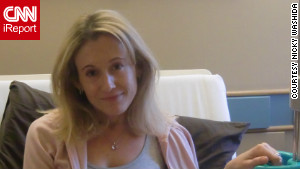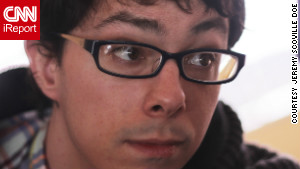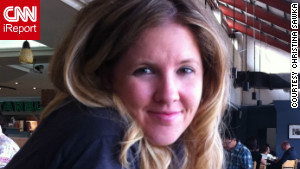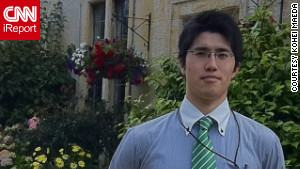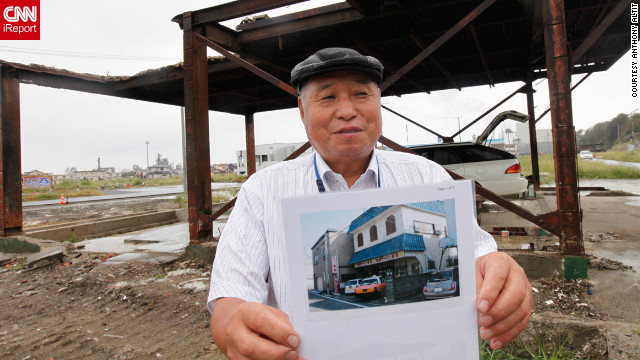
Seiki Sano, 81, stands where his home once stood in Sendai, Japan. It was destroyed in March 2011 in a devastating earthquake and tsunami. The fisherman also lost both of his boats in the tsunami. "It's hard to rebuild," he told iReporter Anthony Altit. "I won't live to see it happen." 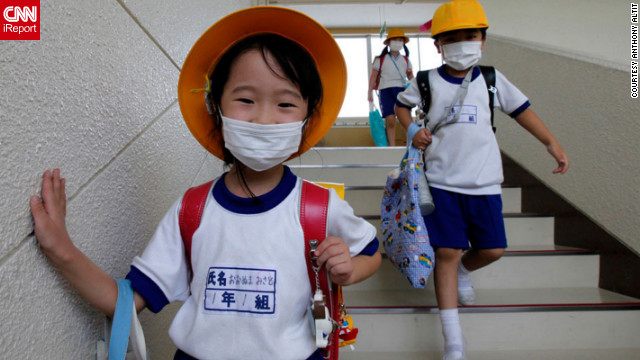
Japanese children in their dormitory in Minamisanriku, which used to be an exotic hotel. "Everyone around here, it seems, is billeted" in nearby dorms, Altit added. 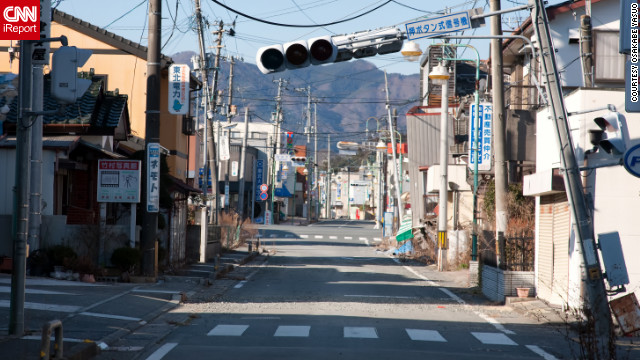
Fukushima remains a ghost town nearly a year after the earthquake, the fourth-largest ever recorded, triggered a nuclear meltdown in the city. 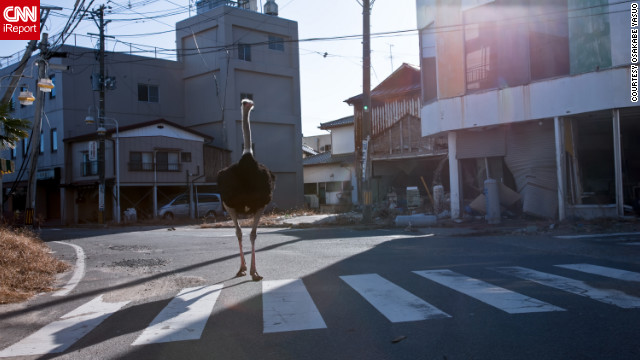
Tokyo-based photographer Osakabe Yasuo recently visited the Fukushima exclusion zone and saw animals, such as this ostrich, wandering the streets. "It still seems like March 11 down there," he said. 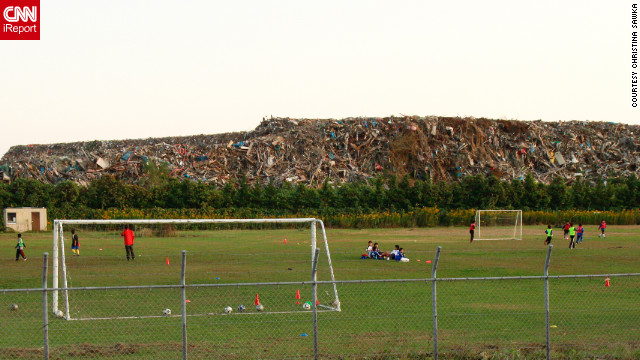
In Shichigahama, cleanup is still a work in progress. Christina Sawka said this trash pile has grown over the past year, but she is optimistic. "I believe 2012 is a year where people's lives and relationships will be restored," she said. 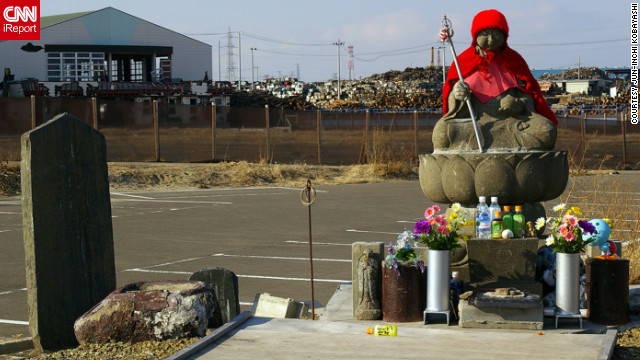
This statue in Miyagi is of Jizo Bosatsu, one of Buddha's disciples who guides dead children to heaven, said iReporter Jun-ichi Kobayashi. People leave offerings at the statue nearly every day. 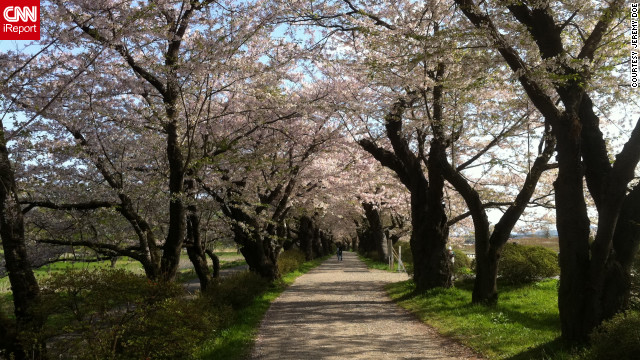
Jeremy Doe, a high-school English teacher living in Kitakami City, took this photo of cherry blossoms to symbolize rebirth. "One year later, we are still dealing with this ... but we are still living," he said. 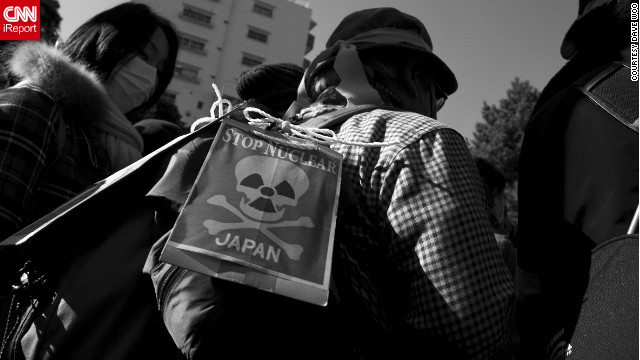
The Fukushima meltdown has caused many Japanese to lash out against nuclear power in the country. "As the date of the one-year mark comes closer, these protests only grow stronger," said iReporter David Woo. 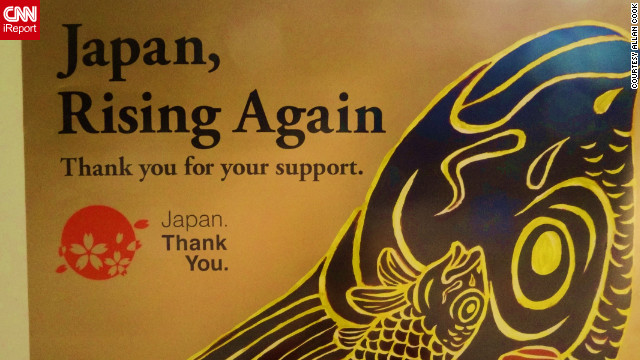
Allan Cook, a British expat living in Japan, said posters like this one have started to crop up around the city of Akihabara. "The simple 'thank you' really makes a strong and meaningful impact," he said. Japan: One year later
Japan: One year later
Japan: One year later
Japan: One year later
Japan: One year later
Japan: One year later
Japan: One year later
Japan: One year later
Japan: One year later
-- From uncertainty to courage, distrust to control, and despair to hope.
Survivors of the massive earthquake and tsunami in Japan have searched for what was lost, sometimes finding more.
"The broken glass has been swept away, the building cracks have been filled and repaired, the pavements have been evened out and to all appearances here in Tokyo, on the surface, everything continues as normal," Nicky Washida
wrote on CNN iReport. "The 'wa' -- harmony -- has been restored. But scratch away just underneath and this is a city that has figuratively and literally been rocked to its core."
In the quest to rebuild their lives, Washida and four others found inner strength, compassion, community, new love and even a new life.
Faith, love and motivation
Christina Ras nearly left Japan for her native Philippines after the earthquake.
"During this one year period of time, the consequences and effects of the earthquake affected my plans, perspective and attitude of dealing with life, especially as a foreigner in Japan," she
wrote in her iReport. "I had to make a plan B. I was very frustrated that living in Japan will be worthless. It was traumatizing and depressing."
Christina Ras with boyfriend Hiroshi Inaba
Ras came to Japan nearly two years ago to study Japanese at the Shinjuku International Exchange School in hopes of becoming a teacher. But after the earthquake, the 24-year-old found it hard to focus on studying. Five of her classmates dropped out and returned to their countries.
"I didn't see any hope back then," she said via Skype. "I [didn't] know what to do, I [didn't] know who to run to but I don't want to go home."
With the economy struggling, Ras found work giving one-on-one lessons in English. She stopped participating in activities she enjoyed, like dance classes and singing, so she could focus on recovering from the earthquake. But she felt even more like an outsider.
Eventually she realized why she was having such a hard time with Japanese.
"I needed to learn the language deeply and in my heart," she said. "If you learn it, you learn the culture."
A trinity of forces brought her life back on track: faith, love and reconnecting with her Japanese classmates.
"I wanted to be involved more. I wanted to know the Japanese people," she said about joining extracurricular activities and social events through school.
It was around the same time, in May, that she returned to church. Her faith had yo-yoed, but her belief was strong again.
"People who have faith in God have positive vibes and are more optimistic," she explained. "If you go with the negative people, you lose yourself, your strength."
Ras opened up her heart to God and somewhere along the line, she opened up her heart to love, too.
A few weeks before the earthquake, she had met Hiroshi Inaba, who seemed, she says, like a "nice and good-looking guy." Despite persistent Facebook messages and other attempts to court her, Ras said no when he asked her out. Always focusing on her future, Ras had never given herself the chance to fall in love, she said.
With the earthquake and every aftershock after that, Inaba called or texted Ras to let her know he was safe. She found herself doing the same for him. Living in towns two hours apart, they shared their worries of aftershocks, food shortages and the situation at the Fukushima Daiichi nuclear power plant.
"There were many nights that we would go on talking through Skype until dawn," she
wrote in her iReport. "Those were the means where we could have intimate talks, know each other deeply and the only given time that we can be ourselves freely."
Three months later, she finally said yes to a date with Inaba.
Love wasn't far behind.
"At first, it was such a euphoria to have an escape from the turmoil we were having but as we were both recovering, we found that strong companionship of getting over and moving on," she said. "Having some love in your heart gives you inspiration, reason, strength, optimistic perspective and it gave me a new direction when I almost didn't know what to do next."
Ras continued studying Japanese, graduated with her degree on Friday, and even found a good job that might turn into a full-time opportunity.
Her sense of direction restored, she is grateful that she didn't give up and leave Japan.
"I realized back then I had a lot of time that was taken from me and a lot of opportunities," she said passionately. "I survived and I still am here, so I might as well work hard and do my best -- take back what was lost from me. ... It would just be for nothing if I go home."
Living in uncertainty
Checking food labels, researching radiation concerns and worrying about future earthquakes consume Nicky Washida's life.
"On the surface, it is business as usual," said the British expat, who has lived in Japan for 10 years. "We wake up, we go to work, we shop for dinner. We drink, we laugh, we care for our children. But running underneath the veneer of normality is the constant reminder that life has changed."
Something as simple as buying food for dinner takes more than a trip to the grocery store. Washida searches for alternate ways to source the family's food since radiation fears from Fukushima arose after the earthquake.
"The way we live now -- such as scanning product labels for sources of ingredients and searching farther afield for 'safe' items -- this is now the new normal," she
wrote in her iReport.
She opts for locally grown produce or imported foods to cut down on the chances of contamination. One family meal this week, for example, consisted of salmon from Chile, squash from Mexico, broccoli from the United States, cauliflower from southern Japan and rice from northern Japan.
"You just don't know whom to trust," she said over Skype. "There is no transparency here with the distribution of food."
More fears lurk beneath the surface. Her oldest, 8-year-old Mia, says she no longer worries about another earthquake, but she refuses to sleep in her own room these days. She prefers to sleep in her little brothers' room, probably because she doesn't want to be alone, Washida said.
At least Mia isn't afraid of water from Tokyo Bay swelling into a tsunami anymore. She used to wake up crying in the middle of the night thinking the bay, visible from the family's balcony, would surge and engulf the house.
"We just seemed to be lurching from one crisis to the next," Washida said. "Things got worse and worse, things were running out. We started to wonder if we should stay or go."
Tension grew between Washida, a Westerner, and her Japanese husband as they argued over the "right" thing to do for the family. She was taught to question, to be critical, while he was taught to listen to authority, she said.
"I'll complain about the situation we've got and he'll get angry at me because he feels I'm attacking his country," she said.
"We've been through so much strain with the earthquake and the tsunami. We're holding it together and we're fine but there's a cultural difference here," she explained, saying her Western friends with Japanese spouses also face similar issues. "That's not thinking that I'm ashamed of. Even among Japanese friends, this is putting a strain on relationships."
The Washida children are all in grade school and the couple didn't want to uproot them from the only home they've ever known for a potentially equally uncertain life in Washida's native UK.
"It just felt important to keep the family together. If I genuinely had felt unsafe, we would have left," she said.
"This is my home now, and in addition to all the practical issues affecting our decision to stay, there is a strong emotional bond keeping me here," she said. "I don't want to abandon the Japanese people and the country. I want to stay and help with the recovery effort in my own small way."
Despite staying put, the decision is "constantly under review," Washida said.
"My family is very much wait and see," she said. "I think that if there's another big earthquake -- they keep threatening it in Tokyo -- or if there's another big leak of radiation, I don't think we will hang on."
Hope in the blooms
The famous spot for gazing at cherry blossoms in Kitakami City, Iwate, is abuzz with its usual crowd of spectators. It has almost been a year since the earthquake, and Jeremy Scoville Doe
appreciates the cherry blossoms not only for their flowers, but also for the "life we have."
Doe, an American expat living in Japan for almost three years, said he was one of the lucky ones.
"It's been really hard for me to report on this story," he wrote on CNN iReport. "To this day I think about how lucky I was and how little I have to say. So many people want dramatic stories and pictures of destruction. I'm happy to have been so close to the epicenter and have neither of those."
But that doesn't mean the quake didn't change him.
A couple of days before the massive quake, Doe was in the shower when he said a 7.0 pre-earthquake "freaked" him out. Terrified with each tremor, the North Carolina native ran to check Twitter and Facebook for updates.
Up until then, Doe could count on one hand the number of large tremors he had experienced while living in Japan. Those quakes had felt like nothing more than a car swaying on a very windy day, he said.
When the March 11 quake hit, Doe was at his desk in the 70-year-old building where he teaches high school English. Thank goodness the students had already gone for the day, he thought, transfixed in pure shock.
"After the earthquake happened, I didn't want to go in my apartment for the entire day," he said. "I had everything in my car. I was planning on sleeping in my car but it was so cold."
The aftershocks continued for months, each time rattling Doe. They have only died down enough for people not to talk about them as much in the last three months, he said.
These days he no longer "freaks out" when he feels small earthquakes. Where his heart palpitated in terror before, "now it takes at least a 6.0 for my heart rate to even change," he said.
But pangs of "survivor's guilt" plague Doe when he thinks of all the people who lost their homes, family members and even their own lives. "I had food. I felt safe. I had my friends around me. I had so much more than even the luckiest person who lived on the coast," he said.
Life around him has fallen back into a normal routine. Only days after the earthquake, the familiar sound of hammering on a nearby housing project tapped away the silence left by the disaster. And two months later, the humming of the Shinkansen bullet train returned. He was grateful to have that sound back from his old life, even though it sounds like a big truck speeding past his apartment.
"One year later we are still dealing with this. It has not gone away," he wrote. "But we are still living. ... To me, that is amazing."
Restoring lives one stitch at a time
Sitting atop the highest hill near her home in Shichigahama, Miyagi prefecture, Christina Sawka waited with family and friends as it started to snow on March 11, 2011. They had felt the earthquake and rushed to higher ground, hoping the tsunami wouldn't reach them.
"We heard the tsunami coming behind us and it was a noise you could never describe. All of a sudden you saw the wave coming from this way and the other way," she said, re-enacting the huge waves with her hands in an interview.
The tsunami washed away all the homes along the beach, scattering debris just about everywhere. The water came within 20 feet of her home.
Having no contact with the outside world, they sat in chairs overlooking the ocean that evening.
Hours after the tsunami, an oil refinery across the ocean exploded. Bundled up in two coats, Sawka watched, terrified.
"It was just like one disaster after another and we didn't even know about Fukushima yet," she said.
They also had no idea of the magnitude of the tsunami until they were able to get out two days later. While all their friends were fine, about 100 people in the 20,000-person town had died. When they later made it to Sendai to shower and reconnect with family online, that's when they saw the footage. "That was really hard," she said.
Three days after the tsunami, Sawka was back out on the hill trying to write down her experiences and conversations with the other townspeople. As she sat alone, her boyfriend, Pete, came outside and proposed.
"Nothing like a proposal overlooking an ocean with the sun setting, black smoke from the fires at the refineries nearby, military helicopters flying by and a nuclear meltdown," she said. "It gave people around here something to smile about."
"It was nice to be able to share some kind of nice news," she added. The couple wed in September 2011.
Life continued. Schoolchildren started walking home along the streets, destroyed structures came down, work began on a new restaurant.
Occasionally Sawka forgets what happened, but there are visual reminders: The roads are emptier and trees and the houses along the beach are gone. "There's an amazing view (of the beach) but now all you see are the foundations. It's a ghost town," she said.
And then there's the
mountain of debris.
Belongings that washed out from peoples' homes during the tsunami have grown into a massive trash heap over the past year. Sawka
documented the mound in photographs to show how the landscape has changed.
While it looks "ridiculous," said Sawka, the pile of rubbish is also a reminder of how much has been rebuilt, with workers piling the items into categories like medical supplies and rubber tires, she said.
Children play soccer at the foot of the trash mountain, trying to hold onto a normal childhood. "I think it's an amazing testament to how life goes on after a disaster," she said.
"I definitely feel that I am more a part of the community here as I experienced this great tragedy with them," said the Australian nonprofit worker. "My days changed dramatically to constantly handing out relief goods within this area and other stricken places and taking photos in order to raise awareness and financial support from those overseas."
Helping out the community has come in all sorts of forms -- even crocheting and knitting. Sawka's mother-in-law, Teddy Sawka, started a group called Yarn Alive.
Many of the women in Shichigahama lost everything in the tsunami and continue to live in cramped temporary housing. Teddy remembered the depression that so many felt after the Kobe earthquake in 1995, so she wanted to give the local women something to do.
Most Japanese women had knitted or crocheted at some point in their lives, so Teddy collected needles, hooks and yarn. Since July 2011, the
group has gathered every Tuesday to knit and crochet and to talk about coping with the disaster, or just to talk about life in general.
"This was an opportunity to give back to them something that they had lost but also to gather together and create a community so that depression and suicidal tendencies would not set in," Christina Sawka said.
"These women who were victims and received donated goods found that it was a blessing to be able to help others," Sawka wrote in her iReport. Many of their blankets and projects have been donated to other communities affected by the tsunami.
Sawka sees these women working together as just one message of hope and survival from 2011. Looking ahead, Sawka said she thinks this will be the year of restoration for Japan.
"I believe 2012 is a year where people's lives and relationships will be restored, homes restored to even better conditions, businesses restored to gain greater profits and Japan as a nation, fully restored in its strength, courage and happiness," she said.
"Everyone's been waiting for this one-year mark."
A seed of the future
In the wake of the earthquake, Kohei Maeda shared a
small story of hope on CNN iReport. His brother and then-fiancée decided to keep their wedding date of March 20 despite people saying it "was not appropriate" in light of the widespread suffering.
The young Tokyo couple tied the knot as planned because they wanted to show there was still hope in Japan. A year later, Ikuhiro and Hiroromi Maeda are cultivating another seed of hope: They're
expecting a baby in late June.
Maeda said the soon-to-be mother, Hiroromi, fears for the future of her child, especially with the threat of radiation in food and water.
Maeda "can't wait" to be a first-time uncle and he only has one wish for the baby: "I hope that the new baby will have a happy life" without nuclear concerns.
Maeda himself may be part of the solution, or so he hopes. The earthquake awakened his dream to one day run for office. He had always imagined that someday he would have the opportunity to spur change in his native land, but never was it so clear as after the disaster.
"The earthquake made me think more concretely. It made me think that I have to do it now," he said via Skype during a lunch break from his job at a venture trading company.
His personal lifestyle hasn't changed since the earthquake, but his way of thinking is entirely different. "Just watching, seeing and saying, 'Oh my God' means nothing. We have to act," he said.
Maeda, 28, studied law in college and intends to run for office under an emerging political party in Japan called Osaka Ishin no Kai, the Osaka restoration group.
If elected, he would first tackle the radiation problem and search for more environmentally friendly energy options. He acknowledged that would require fundamental changes to the system, including denationalizing Japan's power company.
"There is almost no progress about the construction of the buildings that were damaged; the radiation program is nowhere," he said. "It already took a year almost and nothing changed."
Regardless of the ongoing radiation concerns and lingering damaged buildings, Maeda has a message to the rest of the world: "A lot of Japanese are very optimistic, so don't worry about [us] too much."
Keeping with the Japanese idea of ganbare -- "hang in there" or "we can do it" -- Maeda was reminded of a proverb while telling his story on iReport: "A mother is stronger than any other creature."
"We as a family want to do everything we can do to raise the new family member with love and happiness, by all means no matter how bad the environment is. Yes, we can!"
 Call this the opening scene of Act II in her decades-long struggle against an unforgiving, iron-fisted military machine. She will now compete along with other opposition Members of Parliament in trying to influence a quasi-civilian, military dominated government that is chary about its move toward democracy, although it says it is inevitable and will occur in piecemeal steps.
Call this the opening scene of Act II in her decades-long struggle against an unforgiving, iron-fisted military machine. She will now compete along with other opposition Members of Parliament in trying to influence a quasi-civilian, military dominated government that is chary about its move toward democracy, although it says it is inevitable and will occur in piecemeal steps.



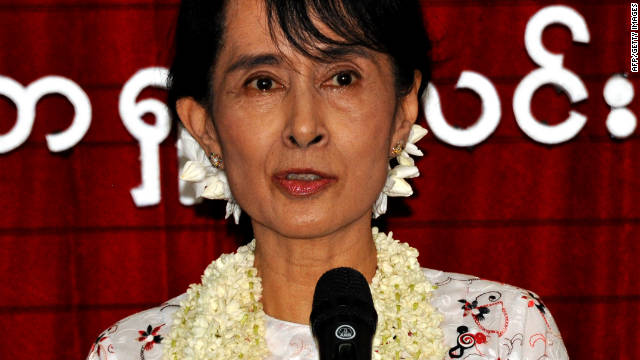
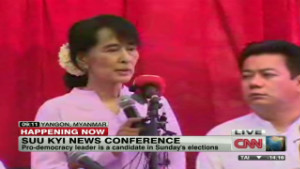
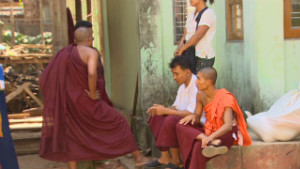
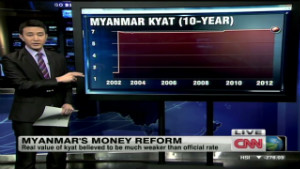
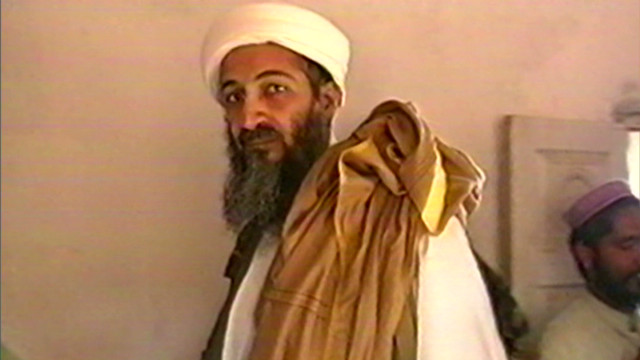

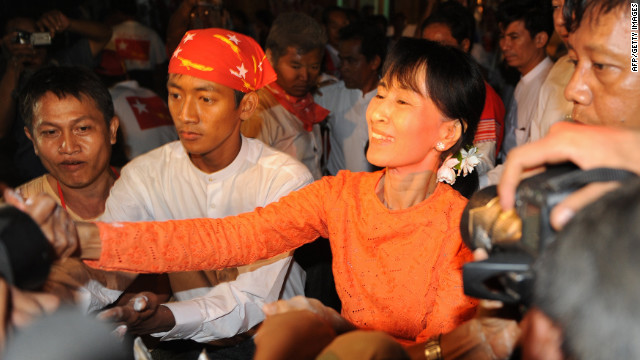











 CNN iReport
CNN iReport


















